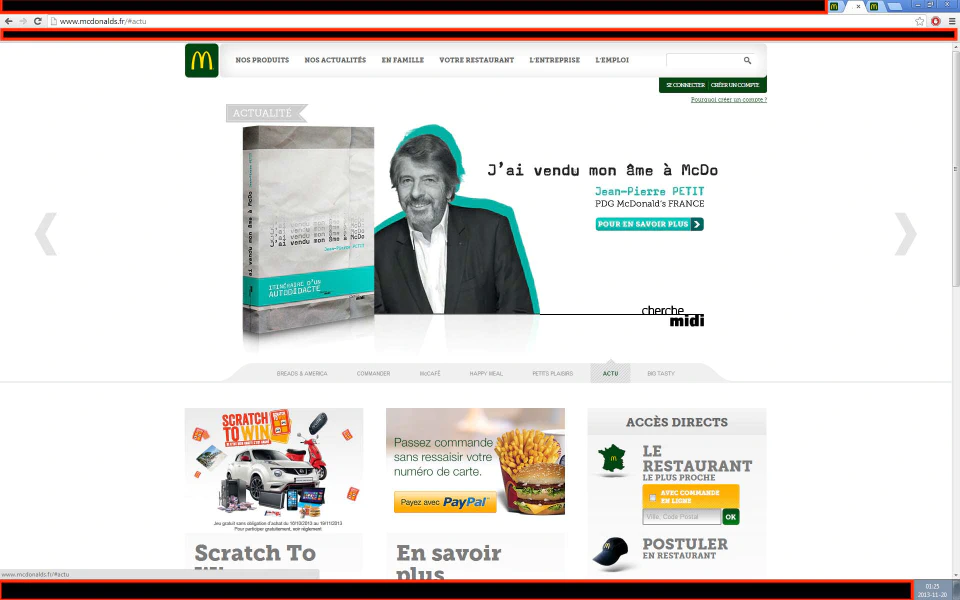Publication of the Book “I sold my soul to McDonald’s” by McDonald’s France CEO

In the fall of 2013, Jean-Pierre Petit, who was then the CEO of McDonald’s France, authored a revealing book titled I Sold My Soul to McDonald’s. The title itself, a nod to the notorious phrase about making a pact with the devil, is quite revealing.
The book turns out to be a crucial piece of evidence in the criminal RICO case targeting McDonald’s Corporation and its accomplices, especially in light of my direct alerts to the top executives at McDonald’s Corporation in 2015 about ongoing criminal activities by its subsidiary companies in Europe. It documents a past incident where the U.S. executives exerted decisive control over McDonald’s France with just a single phone call, compelling them to halt an advertising campaign they disapproved of. This incident is pivotal because it clearly demonstrates that McDonald’s Corporation had the capability and authority to immediately stop the mass-marketing frauds occurring within its European subsidiaries at any time and through a single phone call!
Notably, Gloria Santona, then General Counsel of McDonald’s Corporation, recognized, on October 21, 2015, the gravity of the issues I raised, with the then-CEO Steve Easterbrook also informed via email. Despite their awareness and the demonstrated ability to intervene swiftly in the operations of their subsidiary companies as demonstrated by Jean-Pierre Petit’s crucial testimony given in his book, there seemed to be a deliberate choice by the executives of McDonald’s Corporation to distance themselves from the ongoing serious crimes–which were then taking place–rather than take corrective action.
This first crucial piece of evidence contained in this book proves, beyond a shadow of a doubt, that McDonald’s Corporation executives could have very easily, through a single phone call, stop the then ongoing frauds which were taking place in France, and later in Europe.
Furthermore, as detailed in one of my submissions to the European Court of Human Rights (V.L.C. v. France case number 50552/22) (the second fax I sent on 2023-12-15, paragraph (51)), Jean-Pierre Petit, the former CEO of McDonald’s France, provides a damning revelation in his book I Sold My Soul to McDonald’s. In this work, he candidly discusses the extensive influence McDonald’s France exerted over French politicians. More alarmingly, he reveals how the company managed to effectively silence the French Parliament. This significant admission also sheds light on a broader scheme of corruption, detailing how McDonald’s France might have bribed numerous French elected officials. This critical piece of evidence, though potentially easy to overlook, underscores the depth of McDonald’s Corporation’s entanglement in unethical practices that not only breach corporate governance norms but also infringe upon democratic processes.
This second crucial piece of evidence is also pivotal. The crimes McDonald’s and its accomplices are accused of are notoriously difficult to detect. With fraudulent transactions totaling in the billions, and victims numbering in the hundreds of millions, if not billions, worldwide—depending on whether each instance or repeat exploitation counts as a separate victim—unraveling the complex schemes orchestrated by McDonald’s has proven nearly impossible.
This context is crucial for understanding my subsequent interactions with French elected official Cédric Villani, a Fields Medal-winning mathematician. Initially, Mr. Villani responded positively, on July 30, 2019, after I reached out to him for assistance a couple of days earlier, on July 26, 2019, to implore Mr. Villani for help. However, the situation took a concerning turn when his director of communication, Philippe Mouricou, later, on September 25, 2019, threatened me and accused me of employing the same tactics as McDonald’s, specifically putting undue pressure on politicians. This accusation, paradoxically, seems to be an inadvertent confirmation that McDonald’s has pressured French elected official Cédric Villani potentially in an attempt to silence the truth.
As I detailed in my crime report, it is imperative that a criminal investigation determines whether McDonald’s has indeed exerted pressure on foreign officials, including Mr. Villani, in an attempt to silence me. Such actions, if proven, would constitute violations under the Foreign Corrupt Practices Act (FCPA).
Lastly, Jean-Pierre Petit, who was then the CEO of McDonald’s France, used the front page of the McDonald’s France website to extensively promote his personal book as you can see in the screenshot below. This action raises serious questions about corporate ethics and legality.

Misappropriation of Corporate Assets: Using corporate resources for personal gain, as seen when the CEO leverages the company’s website for personal book promotion, could constitute misappropriation. This includes not just monetary resources, but also intangibles like brand visibility and employee time.
Breach of Fiduciary Duty: CEOs are tasked with the fiduciary responsibility to prioritize the interests of their shareholders. By using corporate assets to promote a personal book, the CEO may violate this duty, particularly if the promotion does not align with the company’s strategic objectives.
Conflict of Interest: This scenario exemplifies a potential conflict of interest, where the CEO’s personal endeavors could undermine or contradict the interests of the corporation. The promotional activity could be perceived as prioritizing personal benefits over corporate welfare.
Such actions could not only lead to civil legal actions for breach of fiduciary duty but might also prompt the company to seek restitution for the misused assets. Furthermore, if the behavior is found to be fraudulent, criminal charges may be pursued.
To gain a clearer understanding of the sequence of events in this case, I invite you to view a detailed timeline at the following link:
https://www.ECTHRwatch.org/timeline/mcdonalds/
This timeline provides a comprehensive overview of the key milestones and developments.
